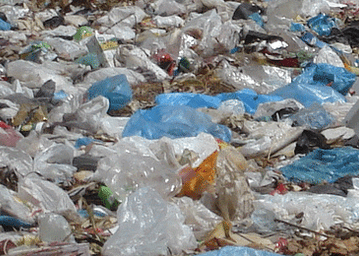
… as it clarifies scope of imminent ban
By Ebenezer NJOKU
The Environmental Protection Authority (EPA) has moved to clarify the scope of an impending plastic ban, stating that only single-use and non-recyclable plastics will be targetted under the forthcoming policy measures – not all plastic products.
Speaking at the 2025 Environmental Sustainability Summit (ESS) organised by B&FT, Acting Director-Human Settlement Unit, EPA, Hope Lomotey said the policy aims to eliminate the most environmentally damaging plastics while allowing the continued use of recyclable and essential plastic materials.
“When you talk of plastic, at times we get confused. Rubber is not plastic. Car tyres are not plastic. The single-use ones are the challenge now,” Mr. Lomotey explained at the event, which was held under the theme ‘Ending Plastic Waste in Ghana: A Sustainable Future for All’.
The clarification comes in the wake of growing public anxiety and misinformation surrounding the proposed ban’s nature and impact. Some industry players and consumers had feared a sweeping prohibition on all plastic-related products.
The announcement follows recent passage of the Environmental Protection Act, 2025 (Act 1124), which consolidates the country’s environmental laws under a new legal framework and grants the EPA overarching authority across all sectors. The Act supersedes previous laws governing the EPA and marks a decisive shift toward integrated and cross-cutting environmental management.
Ghana currently generates an estimated 1.1 million tonnes of plastic waste annually, of which only about five percent is recycled, according to data from the Ministry of Environment, Science, Technology and Innovation (MESTI). The rest ends up in landfills, drainage systems and water-bodies – contributing to urban flooding, marine pollution and adverse health outcomes.
“The days of a linear economy – where we take, use and dispose – are ending,” Mr. Lomotey said.
“We are shifting to a circular economy, whereby you can only manufacture plastic that can be recycled. Problematic plastic that cannot be recycled will never be tolerated as part of the economy,” he added.
The EPA has begun preliminary consultations with manufacturers and importers to sensitise them on the expected policy direction. Mr. Lomotey described these meetings as “not palatable”, on account of the tension between regulatory goals and business realities. However, he stressed that the transition must begin – adding that the EPA is also considering how to manage plastic waste already circulating in the system after the ban takes effect.
The impending ban will draw from the National Plastic Management Strategy (2020), which outlines a phased approach to addressing the domestic plastic crisis through recycling infrastructure, public education and promoting alternatives such as paper, jute and other biodegradable materials.
Earlier this month, on the World Tree Planting Day occasion, President John Mahama also mentioned a sweeping ban on the importation and production of Styrofoam, which coincides with the EPA preparing the institutional and regulatory groundwork for what could be one of the most ambitious environmental reforms in the country’s recent history.
Analysts say the EPA’s clarification is essential for ensuring buy-in from the private sector, which remains a key player in the production, packaging and retail value chains. Businesses that depend on recyclable or long-lasting plastics – particularly in the food, beverage, and logistics sectors – are expected to be exempt from the core restrictions.
The EPA’s engagement strategy also appears designed to head-off any legal or political opposition once enforcement begins.
“Even after the ban, we still have to find a way to manage those plastics already in the system,” Mr. Lomotey noted.
The post Not all plastics to be outlawed – EPA appeared first on The Business & Financial Times.
Read Full Story















Facebook
Twitter
Pinterest
Instagram
Google+
YouTube
LinkedIn
RSS